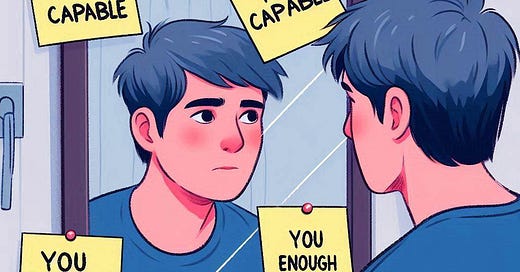Optimism is often misunderstood as blind positivity, but it's far more than that. It's a powerful mindset that combines the belief in a better future with the determination to make it happen. True optimism isn't about passively hoping for the best; it's about actively working towards it - with our head and our hands.
Life often presents us with challenges and uncomfortable situations, and it's tempting to run away or quit when things get tough. However, growth and progress come from facing these difficulties head-on. Avoiding discomfort might provide temporary relief, but it stunts our development in the long run.
My personal journey is a testament to the power of perseverance and growth. “School-aged Roy” was always the last pick for sports teams and did everything possible to avoid phys ed, promptly opting out once gym class became an elective. I was uncomfortable and, frankly, unskilled in anything athletic (to this day, I still suck at “any sport with a ball”.)
This experience extended beyond the gym - far from being one of “the in crowd,” I often felt picked on or excluded socially. I especially remember sitting on a school bench one evening waiting for the after-school activity bus, when two upper class jocks approached menacingly, growling “UNDESIRABLES” before finally going their own way and leaving me alone.
Fast forward to today, where my life looks dramatically different. I'm now a firefighter and an EMT working at two “volunteer” departments and one career department. I own and operate a fitness studio, am a respected fitness coach, and am seen as a subject matter expert. I've completed in more than a dozen marathons, several ultra-marathons including a 50-plus miler, a dozen half-iron triathlons, and countless smaller races - even finishing on the podium at a number of them (probably because runners and triathletes don’t play with a ball).
Despite these successes, I still grapple with “imposter syndrome” - a self-doubt of my skills, my intellect, and my achievements. In the mirror, I still see that nerdy, picked-on kid from high school, and tell myself “I don’t belong here” or “I’m going to look like a fraud.” I sometimes struggle to reconcile this image with my current reality. It's a problem many people experience: How do we overcome imposter syndrome? How do we move past our old self-perceptions when our lives have changed so dramatically?
Interestingly, research shows that positive reinforcement from others can have a significant impact on performance. For example: when someone is told they thrive under pressure, their actual performance improves by more than 30%, even if the statement was made without any factual basis. Further, studies in psychology show that encouraging yourself using “you” instead of “I” - telling yourself “YOU thrive under pressure” rather than “I thrive under pressure” - is almost as convincing to our brains as that compliment from a friend. This highlights the power of positive self-belief and external encouragement in shaping our mindset, capabilities, and outcomes.
Each of us is on a lifelong journey of personal growth that involves embracing optimism, facing challenges, seeking support, and recognizing our achievements. When imposter syndrome persists, remember that your past does not define your present or future. Keep pushing forward, acknowledge your progress, surround yourself with positive and supportive people, and don't be afraid to seek help when needed.
And always remember - an encouraging word to someone else can lift them up in ways you might never realize.





